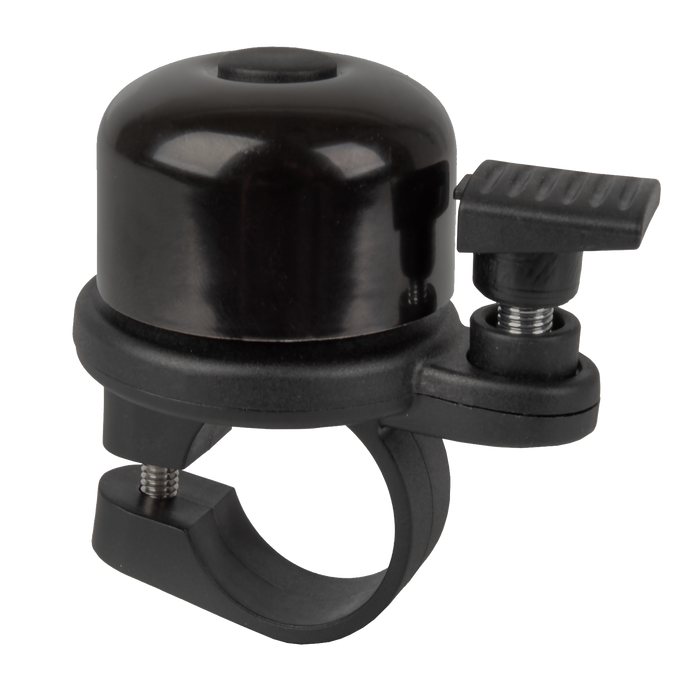
AirBell® Mini Bell for Airtag
incl. FREE shipping & free returns

Von Vincent Augustin |
5 minutes read time

In this article we look at the advantages and disadvantages of GPS trackers for bicycles and highlight the legal aspects.
GPS trackers are small devices that attach to a bike and use satellite signals to track the bike's location in real time. There are several different types of GPS trackers , including those that are integrated into the frame and removable models. They offer a variety of functions, from simple tracking to complex monitoring functions.
A possible cheaper alternative could be Apple AirTags. AirTags are small, discreet tracking devices that work using Apple's Find My network. Here are some things to consider if you want to use AirTags for bike tracking:
Hiding the AirTag : To prevent theft, you should attach the AirTag to an inconspicuous place on your bike. Some possible hiding places are:
Range and network connectivity : AirTags use Bluetooth to contact nearby Apple devices and send their location to Apple servers. This means the AirTag is particularly effective in urban areas with many Apple users. In rural or remote areas, tracking may be less effective.
Battery life : AirTags have a replaceable battery that lasts about a year. It's important to check and replace the battery regularly to ensure the AirTag always works.
Safety features : AirTags send a signal to nearby Apple devices, but they also have safety features built in to prevent unwanted tracking. If an AirTag is separated from its owner for an extended period of time and moves near a stranger, that person will receive a notification on their iPhone.
Cost : AirTags are relatively inexpensive, making them an attractive option for bike tracking. The price per AirTag is usually around 30-35 euros.
Legal framework in Germany : In Germany, the use of GPS trackers is generally permitted as long as they serve security and theft protection purposes. However, it is important to find out about the specific regulations.
Data protection and privacy : When using GPS trackers, the data protection regulations according to the GDPR must be observed. This means that the data may only be collected and used with the express consent of the owner.
Use in public and private areas : There are different regulations for the use of GPS trackers in public and private areas. For example, trackers may not be used to monitor people without their knowledge.
Bicycle theft is an annoying event, but it can be better managed with the right measures. The first step should always be to report it to the police, for which the frame number and photos of the bike are useful. In many cases, home contents insurance will cover theft of bicycles, provided it was properly insured and the bike was properly secured.
Specialized theft insurance can offer additional protection, especially for high-value bikes. The situation becomes more complex when stolen bikes are transported to other European countries. Legal challenges arise here, as recovery across national borders is more difficult. International agreements and cooperation between police authorities are crucial, but they are time-consuming and often complicated.
It is therefore important to report the loss immediately and provide all available information to increase the chances of recovery. Comprehensive insurance and a quick police report are therefore essential to both minimize financial damage and avoid legal problems.
A fascinating study from TU Delft and MIT Senseable City Lab has revealed that bicycles often stay within their immediate neighborhood. This finding comes from a detailed study of bicycle movement patterns in urban areas, conducted using extensive data analysis. The researchers found that bicycles are typically used within a limited radius from their starting point, indicating the strong local nature of bicycle use. These findings could have significant implications for urban planning and cycling promotion, as they highlight the importance of improving cycling infrastructures within neighborhoods. More details and the full results of the study can be read in the publication on PLOS ONE here .
Although tracking a stolen bike using GPS can help determine the bike's location, you should not act on your own. As soon as the location has been determined, the information must be reported to the police immediately. They will then take the necessary steps to recover the bike safely and legally. Vigilante justice must be avoided at all costs, as this can have legal consequences and endanger your own safety. The police are able to legally return the property and pursue any perpetrators. It becomes particularly complex if the bike has been stolen abroad. International police cooperation comes into play here, and the processes can be significantly delayed. Despite the ease provided by GPS tracking, cooperation with the authorities remains the safest way to get stolen bikes back.
In summary, GPS trackers offer a more or less effective way to improve the security and monitoring of bicycles. However, the decision for or against a GPS tracker depends on individual needs and willingness to accept possible disadvantages. For many cyclists, a GPS tracker can be a valuable investment, especially in areas with high theft rates. If you are near the border, insurance and a good bike lock may be a more sensible investment.